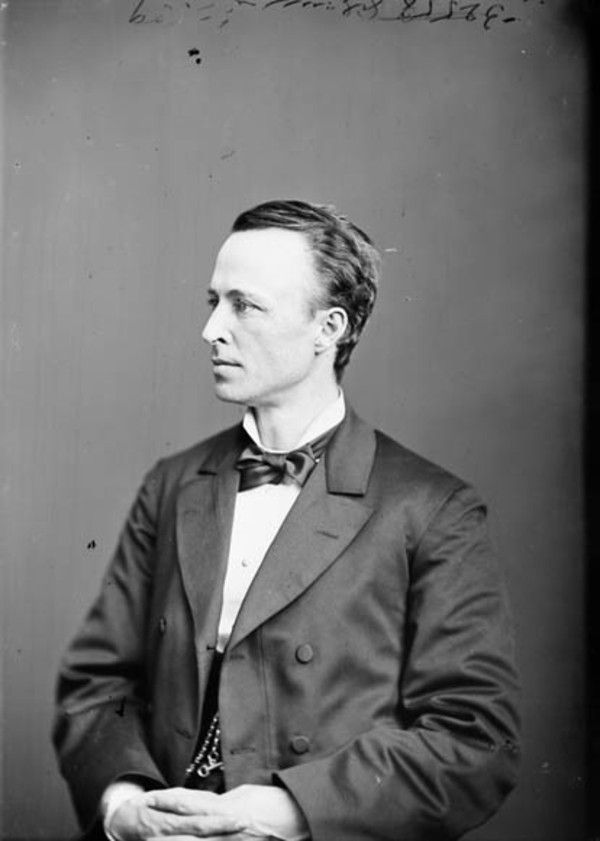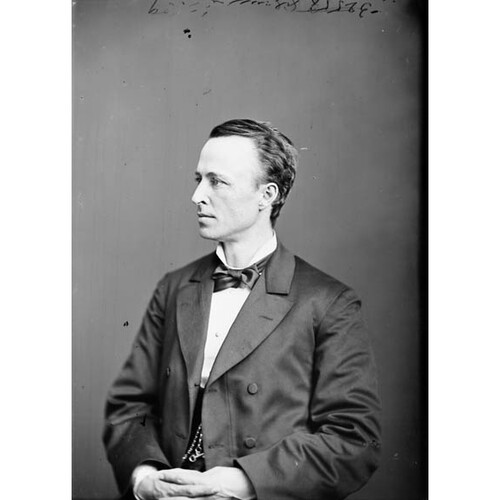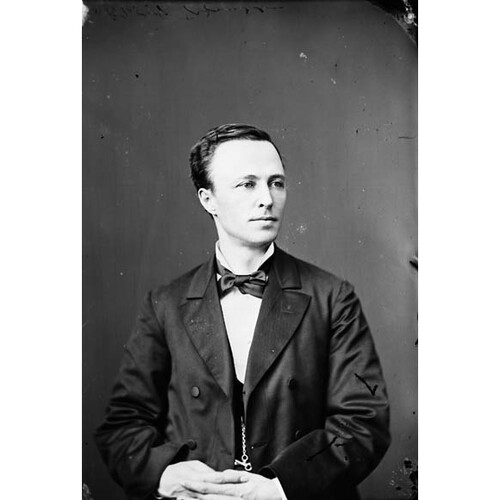GIGAULT, GEORGE (Georges)-AUGUSTE, notary, politician, and civil servant; b. 23 Nov. 1845 in Saint-Mathias, Lower Canada, son of Pierre Gigault, an innkeeper, and Marguerite Wait; m. 12 July 1870 Isabella Dillon (d. 14 Dec. 1930) in Saint-Mathieu (Belmil), Que., and they had four daughters, and two sons, one of whom survived; d. 25 April 1915 in Sainte-Foy, Que.
Following classical studies at the Séminaire de Saint-Hyacinthe and legal training in Montreal, George-Auguste Gigault was licensed as a notary in October 1867. He practised in Saint-Césaire from 1867 to 1892, and in Sainte-Foy on an occasional basis from 1907 to 1914. His notarial duties did not occupy him full-time (he drew up between 150 and 300 acts per year), and he also served as postmaster from 1870 to 1874. In the federal election of 1874, held in the midst of the Pacific Scandal [see Sir Hugh Allan*; Sir John A. Macdonald*], he ran as the Conservative candidate in his riding of Rouville, where he was soundly defeated by the Liberal Guillaume Cheval. Already active at the local level as secretary-treasurer of the Saint-Césaire school board (1867–79), in January 1875 Gigault became mayor, an office he retained until the end of 1877; during his term the village acquired its first water system. In the 1878 federal election Gigault succeeded in defeating the incumbent Liberal by the slim majority of 35 votes. He would represent Rouville until 1891.
Because of his own interests as much as because of the fact that he represented a rural riding, Gigault dealt primarily with agricultural issues in the House of Commons. He steadfastly defended the National Policy, emphasizing its benefits for the farming sector. In January 1884 he successfully proposed the creation of a select committee “to inquire into the best means of encouraging and developing the agricultural industries of Canada.” Chaired and led by Gigault himself, the eight-member committee surveyed 1,500 Canadian farmers and agricultural experts on “the disadvantages and wants experienced by agriculturists.” Detailed analysis of the 385 responses made clear to the committee that farmers knew little about the available varieties of grains and the most economical and efficient methods of growing them, the value of fertilizers, the optimum conditions for production in the dairy sector, and the best means of improving breeds and of raising livestock, or about fruit farming and its problems. The committee heard from 14 other experts, whose views and statements were also analysed. Its report noted that the federal Department of Agriculture essentially was concerned with patents, censuses, and immigration, and that, like its American counterpart, the Canadian department had little to do with farming, except for the control of animal diseases [see Sir John Carling]. The committee proposed the creation of a central bureau of agriculture and of an experimental farm that would conduct research to be published in reports and bulletins for agricultural organizations. The report led to supplementary studies and to the initiation of the Dominion Experimental Farms system in 1886 [see William Saunders].
The hanging of Louis Riel* on 16 Nov. 1885 profoundly affected Gigault’s political career. Along with other francophone Conservative mps, he had tried to prevent the execution by putting pressure on Joseph-Adolphe Chapleau* and Sir Hector-Louis Langevin* to resign from the cabinet. When they refused, and Riel was hanged, Gigault joined the dissident Conservatives and Liberals who regrouped in a nationalist movement. On 11 March 1886, in the best speech of his career, he unequivocally supported the motion of Conservative Philippe Landry censuring the government for Riel’s execution: the vote confirmed his break with the party. In the 1887 general election Gigault ran as an independent Conservative; he was one of the three disaffected Conservatives for whom the party did not seek opponents, probably hoping to reintegrate them eventually. Re-elected by acclamation, Gigault none the less refused to support the Conservative government, which had been narrowly returned to power. One of the few times he participated in debates was when D’Alton McCarthy* attacked francophones and their institutions. Less and less active in the house, Gigault lost by 69 votes in the 1891 election. He then turned to the provincial scene and tried in March 1892 to unseat Liberal mla Alfred Girard in Rouville. Defeated by a mere 25 votes, he now had to rethink his public career.
He was helped by the Conservatives’ return to power in Quebec: on 11 April 1892 he was given the position of assistant commissioner in the Department of Agriculture and Colonization, an office vacant after the death of François-Xavier-Antoine Labelle* on 4 Jan. 1891. Despite the reaction of the Liberal opposition to his appointment, there was no doubt that Gigault was well prepared for the duties, given his experience and his contacts in the agricultural world. His personal qualities, in particular his dynamism and his integrity, quickly won him the confidence of farmers. He played a key role in the expansion of farm clubs and cooperatives, agricultural schools, Le Journal d’agriculture illustré (Montréal) [see Édouard-André Barnard*], and the dairy industry (especially the making of butter). To improve quality and productivity in this industry, he went to Europe, Denmark in particular, in search of the most up-to-date methods.
When the Department of Agriculture and Colonization was divided in January 1897, Gigault became assistant commissioner in the new Department of Agriculture, where he would finish his career under various Liberal governments. From 1909 he had an energetic ally in the minister, Joseph-Édouard Caron*. Together, they threw themselves into the creation and reorganization of agricultural cooperatives, all the while trying hard to remove them from the influence of the United Farmers movement [see Edwin Carswell]. They made great efforts to promote the dairy industry in Quebec and organize the training of producers and processors. Their contribution to the growth of that sector helped assure it the dominant position it has held ever since.
Having lived for a while at Quebec City in an apartment on Avenue des Érables, in 1897 George-Auguste Gigault settled on a farm at Sainte-Foy. Very active in the local farm club, he also served as warden of Quebec County. His son Pierre-Horace ran the farm. Gigault died in office on 25 April 1915, in his 70th year. An official ceremony at the Church of Saint-Jean-Baptiste in Quebec City drew many political figures and provincial civil servants, especially colleagues who shared his interest in agricultural issues. The funeral and burial took place at Notre-Dame-de-Foy in Sainte-Foy.
AC, Québec, Minutiers, J.-A. Charlebois, 2 août 1897; G.-A. Gigault, 1867–1914. ANQ-M, CE1-49, 12 juill. 1870; CE2-22, 24 nov. 1845. ANQ-Q, CE1-20, 28 avril 1915. L’Événement, 26, 28 avril 1915. La Patrie, 28 avril 1915. La Presse, 26 avril 1915. Le Soleil, 26, 28 avril 1915. T. H. Anstey, One hundred harvests: research branch, Agriculture Canada, 1886–1986 (Ottawa, 1986). Can., House of Commons, Debates, 27 March, 18 April 1879; 16 March 1880; 14 March, 2 April, 19, 21–22 May 1883; 30 Jan. 1884; 13 April 1885; 7 May 1886; 26 April 1887; 20 March 1888; 14 Feb., 14 March 1889; 13 Feb. 1890; Journals, 1884, app.6. Canadian directory of parl. (Johnson). V. C. Fowke, Canadian agricultural policy: the historical pattern (Toronto, 1946; repr. 1978). Jean Hêtu, Album souvenir, 1878–1978; centenaire de la faculté de droit de l’université de Montréal (Montréal, 1978). Qué., Ministère de l’Agriculture, Rapport, 1914–15. Rumilly, Hist. de la prov. de Québec, 7: 31. Statistiques électorales fédérales du Québec, 1867–1980, Pierre Drouilly, compil. (Montréal, 1983).
Cite This Article
Marc Vallières, “GIGAULT, GEORGE (Georges)-AUGUSTE,” in Dictionary of Canadian Biography, vol. 14, University of Toronto/Université Laval, 2003–, accessed December 31, 2025, https://www.biographi.ca/en/bio/gigault_george_auguste_14E.html.
The citation above shows the format for footnotes and endnotes according to the Chicago manual of style (16th edition). Information to be used in other citation formats:
| Permalink: | https://www.biographi.ca/en/bio/gigault_george_auguste_14E.html |
| Author of Article: | Marc Vallières |
| Title of Article: | GIGAULT, GEORGE (Georges)-AUGUSTE |
| Publication Name: | Dictionary of Canadian Biography, vol. 14 |
| Publisher: | University of Toronto/Université Laval |
| Year of publication: | 1998 |
| Year of revision: | 1998 |
| Access Date: | December 31, 2025 |





